Related Research Articles
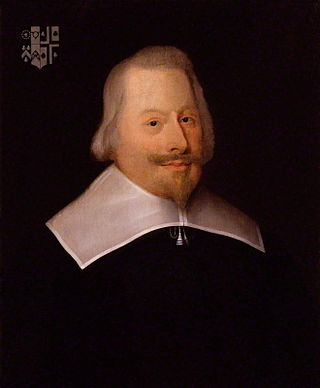
John Pym was a politician and administrator from London, generally seen as one of the founders of Parliamentary democracy in England. One of the Five Members whose attempted arrest in January 1642 sparked the First English Civil War, his use of procedure to outmanoeuvre opponents was unusual for the period and he was respected by contemporaries rather than admired. In 1895, the political historian Goldwin Smith described him as "the greatest member of Parliament that ever lived".

Edmund Calamy was an English Presbyterian church leader and divine. Known as "the elder", he was the first of four generations of nonconformist ministers bearing the same name.
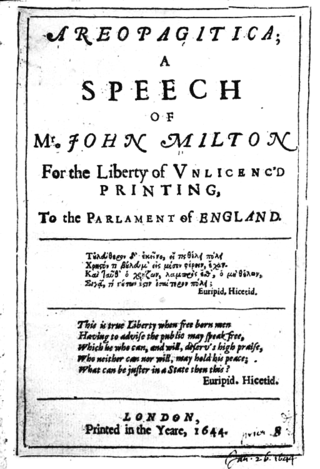
Areopagitica; A speech of Mr. John Milton for the Liberty of Unlicenc'd Printing, to the Parlament of England is a 1644 prose polemic by the English poet, scholar, and polemical author John Milton opposing licensing and censorship. Areopagitica is among history's most influential and impassioned philosophical defences of the principle of a right to freedom of speech and expression. Many of its expressed principles have formed the basis for modern justifications.

The First English Civil War took place in England and Wales from 1642 to 1646. It is part of the 1639 to 1653 Wars of the Three Kingdoms, which also include the Bishops' Wars, the Irish Confederate Wars, the Second English Civil War, the Anglo-Scottish war (1650–1652) and the Cromwellian conquest of Ireland. Historians calculate some 15% to 20% of all adult males in England and Wales served in the military between 1639 and 1653, while around 4% of the total population died from war-related cause, versus 2.23% in World War I. These figures illustrate the impact of the conflict on society in general, and the bitterness it engendered.
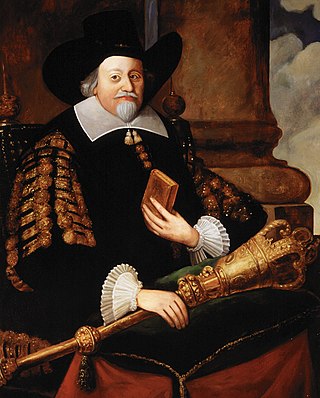
Francis Rous, also spelled Rouse, was an English politician and Puritan religious author, who was Provost of Eton from 1644 to 1659, and briefly Speaker of the House of Commons in 1653.

The Westminster Assembly of Divines was a council of divines (theologians) and members of the English Parliament appointed from 1643 to 1653 to restructure the Church of England. Several Scots also attended, and the Assembly's work was adopted by the Church of Scotland. As many as 121 ministers were called to the Assembly, with nineteen others added later to replace those who did not attend or could no longer attend. It produced a new Form of Church Government, a Confession of Faith or statement of belief, two catechisms or manuals for religious instruction, and a liturgical manual, the Directory for Public Worship, for the Churches of England and Scotland. Confession and catechisms were adopted as doctrinal standards in the Church of Scotland and other Presbyterian churches, where they remain normative. Amended versions of the Confession were also adopted in Congregational and Baptist churches in England and New England in the seventeenth and eighteenth centuries. The Confession became influential throughout the English-speaking world, but especially in American Protestant theology.
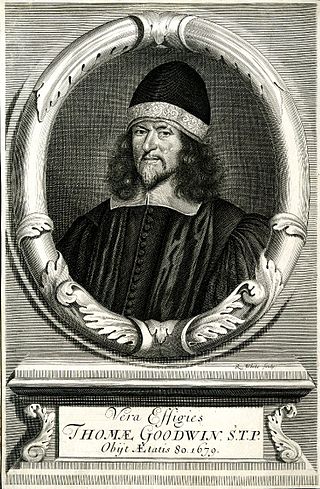
Thomas Goodwin, known as "the Elder", was an English Puritan theologian and preacher, and an important leader of religious Independents. He served as chaplain to Oliver Cromwell, and was appointed by Parliament as President of Magdalen College, Oxford, in 1650. Christopher Hill places Goodwin in the "main stream of Puritan thought".
Thomas Edwards (1599–1647) was an English Puritan clergyman. He was a very influential preacher in London of the 1640s, and was a polemical writer, arguing from a conservative Presbyterian point of view against the Independents.
The Savoy Declaration is a Congregationalist confession of Faith. Its full title is A Declaration of the Faith and Order owned and practised in the Congregational Churches in England. It was drawn up in October 1658 by English Independents and Congregationalists meeting at the Savoy Hospital, London.

The Directory for Public Worship is a liturgical manual produced by the Westminster Assembly in 1644 to replace the Book of Common Prayer. Approved by the Parliament of England in 1644 and the Parliament of Scotland in 1645, the Directory is part of the Westminster Standards, together with the Westminster Confession of Faith, the Westminster Shorter Catechism, the Westminster Larger Catechism, and the Form of Church Government.
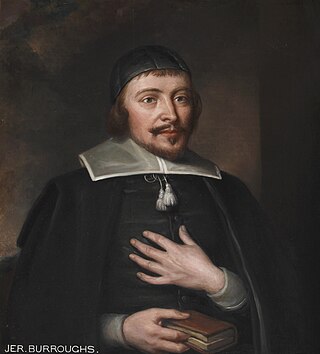
Jeremiah Burroughs was an English Congregationalist and a well-known Puritan preacher.
Milton's divorce tracts refer to the four interlinked polemical pamphlets—The Doctrine and Discipline of Divorce, The Judgment of Martin Bucer, Tetrachordon, and Colasterion—written by John Milton from 1643–1645. They argue for the legitimacy of divorce on grounds of spousal incompatibility. Arguing for divorce at all, let alone a version of no-fault divorce, was extremely controversial and religious figures sought to ban his tracts. Although the tracts were met with nothing but hostility and he later rued publishing them in English at all, they are important for analysing the relationship between Adam and Eve in his epic Paradise Lost. Spanning three years characterised by turbulent changes in the English printing business, they also provide an important context for the publication of Areopagitica, Milton's most famous work of prose.
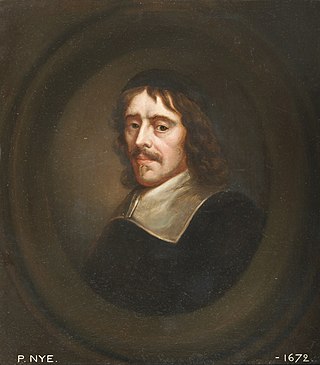
Philip Nye was a leading English Independent theologian and a member of the Westminster Assembly of Divines. He was the key adviser to Oliver Cromwell on matters of religion and regulation of the Church.
Charles Herle (1598–1659) was a prominent English theologian, of moderate Presbyterian views.
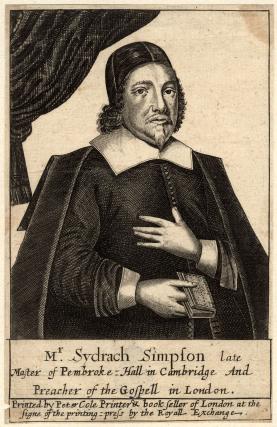
Sidrach Simpson (c.1600-1655) was an English Independent minister, one of the leaders of the Independent faction in the Westminster Assembly.
Adam Steuart (1591–1654) was a Scottish philosopher and controversialist.
Lazarus Seaman, was an English clergyman, supporter in the Westminster Assembly of the Presbyterian party, intruded Master of Peterhouse, Cambridge, and nonconformist minister.
Thomas Coleman (1598–1647) was an English clergyman, known for his scholarship in the Hebrew language, which earned him the nickname ‘Rabbi Coleman’, and for his Erastian view of church polity. In the Westminster Assembly he was the clerical leader of the Erastian party, alongside the lawyer John Selden. Selden praised him, with Thomas Erastus, in his De Synedriis.

Under Charles I, the Puritans became a political force as well as a religious tendency in the country. Opponents of the royal prerogative became allies of Puritan reformers, who saw the Church of England moving in a direction opposite to what they wanted, and objected to increased Catholic influence both at Court and within the Church.
The Eleven Members were members of the House of Commons of England, who were identified by commanders of the New Model Army as their principal opponents. They were suspended and forced into exile for six months; after the 1648 Second English Civil War, many were permanently removed in December 1648.
References
- ↑ Stewart, Angus. "The Westminster Confession and Church Unity". Covenant Protestant Reformed Church. Retrieved 13 September 2013.
- ↑ Rose, Jaqueline (2011). Godly Kingship in Restoration England: The Politics of The Royal Supremacy, 1660–1688 CUP. ISBN 9781139499675. p. 80
- ↑ Jones, Robert Tudur; Dix, Kenneth; Ruston, Alan (2006). Protestant Nonconformist Texts: 1550 to 1700. Ashgate Publishing, Ltd. p. 151. ISBN 978-0-7546-3864-3.
- ↑ Taylor, Stephen; Tapsell, Grant (2013). The Nature of the English Revolution Revisited: Essays in Honour of John Morrill. Boydell Press. pp. 36–39. ISBN 978-1-84383-818-0.
- ↑ Some Observations and Annotations upon the Apologetical Narration (1644)
- ↑ C. V. Wedgwood (1958), The King's War 1641–1647, Collins, p. 285, OL 25430542M